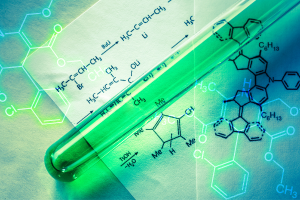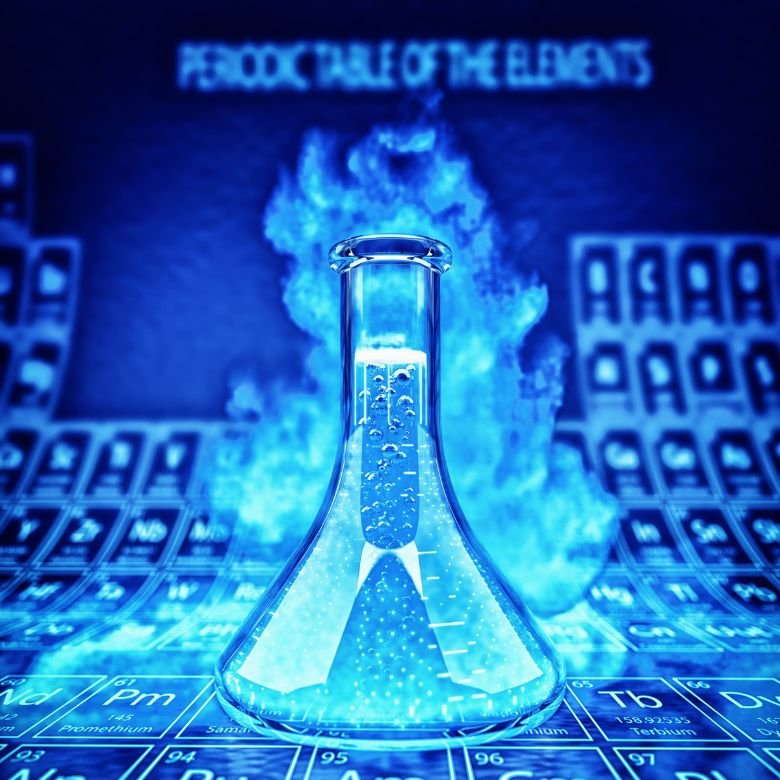Every day, chemical reactions take place all around us. In the course of a reaction, substrates are transformed and different products are formed, often having completely different properties. Chemical reactions can be classified according to various criteria, including the physical state of the substrates and products or the energy effect. However, they are most often divided depending on the type and number of components involved in them and accordingly, we can distinguish synthesis, decomposition and displacement reactions.

Synthesis reactions
A reaction in which a single product is formed from more than one substrate is called a synthesis reaction. These reactions are also referred to as combination reactions. Chemical synthesis usually involves simple substances combining to form a more complex product. They are used to obtain certain chemical compounds, e.g. to obtain hydrogen chloride, one need to perform a synthesis reaction using hydrogen gas and chlorine gas.
Examples of synthesis reactions include the dissolution of acidic or basic oxides in water or the synthesis of oxides from oxygen and an appropriate element. Polymerisation and condensation reactions are specific examples of synthesis reactions.
Decomposition reactions
In decomposition reactions chemical substances or elements are obtained from one chemical compound via its breakdown. That is why those reactions are also called breakdown reactions. In this type of transformation, two or more products are obtained from a single substrate. Some of the products in a decomposition reaction may have a different physical state, such as gaseous, and leave the reaction environment very quickly, which may mislead an observer into thinking that only one product was formed.
Examples of decomposition reactions are the decomposition of magnesium carbonate, calcium carbonate or mercury oxide.
Displacement reactions
Displacement reactions involve substrates interacting with each other in such a way that it results in products having the same qualitative composition but different configurations of linkages between the elements. There are single displacement reactions, in which one complex substance and one simple substance interact an exchange takes place and two products are formed – one new complex substance and one new simple substance. There are also double displacement reactions involving two substrates, both of them complex. These reactions result in two products, which are both new complex substances.
Examples of displacement reactions include processes between salts (e.g. the reaction of iron(III) chloride with sodium(V) phosphate), acids and hydroxides, i.e. classic neutralisation reactions (e.g. the reaction of hydrochloric acid and sodium hydroxide) or metals and acids (e.g. the reaction of zinc with sulphuric(VI) acid).
Redox reactions
Redox reactions are otherwise known as oxidation-reduction reactions. Oxidation is a process during which electrons are donated by ions or atoms. This increases the oxidation state of the chemical element. In contrast, during reduction, ions or atoms accept electrons and their oxidation state decreases. When both these reactions occur simultaneously, they are referred to as redox reactions and in summary, they consist in the transfer of electrons between interacting molecules. The stoichiometric coefficients in such reactions are balanced based on the determined oxidation states of individual ions and atoms involved in the redox reaction. Chemical elements that undergo oxidation or reduction as a result of such a reaction, form pairs of oxidised and reduced forms.
Using redox reactions, one can write down, for example, corrosion processes occurring on the surface of metals, the dissolution of metals in acids or the synthesis of compounds from pure elements.

Other classification criteria for chemical reactions
As stated above, chemical reactions are divided into synthesis, decomposition, displacement and redox reactions. There are also other criteria that characterise chemical processes in more detail.
Heterogeneous and homogeneous reactions
This classification takes into account the number of phases in the reaction system. A reaction is considered homogeneous when the substrates and products are present in the same phase, e.g. gaseous or liquid. Heterogeneous reactions take place at the interface of different phases (two or more).
Exothermic and endothermic reactions
An important aspect of a given chemical reaction, is its energy effect. According to this criterion, we can distinguish exothermic and endothermic reactions. In the case of the former, as a result of the process taking place, energy is released in the form of heat. For endothermic reactions, it is the opposite – energy has to be supplied to the system for a chemical reaction to take place.
Reversible and irreversible reactions
A chemical reaction is reversible or irreversible depending on whether it can reach completion. Irreversible reactions are those in which the substrates are entirely converted into products. Typically, these are precipitation processes or processes that produce a volatile product that leaves the reaction environment. In reversible reactions, on the other hand, substrates react to form products and the opposite process, i.e. reconstitution of substrates from products, occurs at the same time. After a certain period of time, the system reaches chemical equilibrium.
